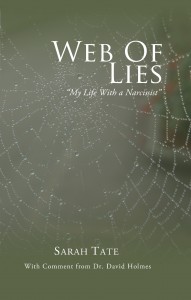 Today my special guest is Sarah Tate, author of the autobiographical novel Web of Lies – My Life With a Narcissist.
Today my special guest is Sarah Tate, author of the autobiographical novel Web of Lies – My Life With a Narcissist.
Sarah Tate was a young newcomer to Switzerland when she was swept off her feet by a company manager, Bill, seventeen years her senior. Bill had been married twice, but his second wife had recently taken her own life after becoming severely depressed. He impressed Sarah with the type of courtship rarely seen these days, luring her with both his intellect lavish gifts and trips. Sarah wanted both love and security, and quickly fell for a man who seemed worldly, but also sensitive and caring. Bill proposed within a few months and Sarah began planning an elegant wedding and exciting new life.
Sarah soon had misgivings about Bill, but fought to keep the marriage on track, despite the fact that Bill had a lackadaisical attitude toward work while nonetheless bragging incessantly about various entrepreneurial schemes which were going to make him millions of dollars — but, of course, never came to fruition.
“Elements of [narcissistic personality] disorder are woven into the character portrayed in this book with aspects of another personality state also familiar to forensic psychologists, psychopathy,” according to Dr. David A. Holmes. Sarah eventually discovered the truth behind Bill’s lies and schemes, but not before seeing his dark side . . . In reality, Bill had narcissistic personality disorder. According to Dr. David A Holmes, Senior Lecturer in Psychology at Manchester Metropolitan University, individuals with narcissistic personality disorder “are highly self-centered, having an unrealistically high opinion of themselves and their status, a pervasive and persistent grandiosity in all areas of their lives and [are] not simply showing off to a few friends. They require constant attention and compliments, but lack genuine empathy for others and thus select acquaintances on the basis of utility or attentiveness and exploit them without consideration for the other’s feelings or welfare, thinking they can only relate to people with high status, which is how they see themselves, and ignore those they perceive as ordinary. Narcissists will fabricate their lives and lie continually in order to maintain false status.”
As the marriage ended, Sarah battled serious clinical depression as she fought her way out of her destructive relationship with Bill. Sarah’s primarily goal was keeping her children safe from Bill and breaking the pattern of abuse. Eventually, she found the courage to stand up to Bill for the final time and carve out a new life for herself and her children, despite being alone and in debt.
Web of Lies is an important book in that real-life stories like Sarah’s educate others about the dangers of entering into a relationship with someone suffering from a Personality Disorder, according to Dr. Holmes. “Real life examples such as that contained in this book can reach in to these situations and perhaps avoid human suffering. Many of the aspects of what is now termed dangerous and severe personality disorder (DSPD) are evident in the pages of this book, from the characteristic disregard for the truth, law and feelings of others, to dismissal of the rights of those standing in his way. It may not be necessary to meet the full criteria for narcissistic personality disorder or psychopathy in order to wreck the lives of others, but it is vital that potential victims are very aware of all of these warning signs.”
C-PTSD – When Pain is Like a Boomerang
by
Sarah Tate
Many people have contacted me recently to ask me about recovery and what the time scale is for it.
There is no answer to that question. Recovery cannot be measured in time; it is a variable entity, which can one minute appear to have been achieved, and the next minute appear to elude us completely.
Many people who have suffered in a long term toxic relationship experience what is known in psychology circles as Complex Post Traumatic Stress Disorder (C-PTSD). Whereas Post Traumatic Stress Disorder (PTSD) is usually the result of one major event or occurrence, C-PTSD is known to be caused after a person has suffered a long-term situation wherein he/she felt a “loss of control” due to emotional or physical abuse, kidnapping, imprisonment, or long term exposure to unpleasant or crisis situations. (C-PTSD is not a personality disorder. It has sometimes been wrongly linked to Borderline Personality Disorder, but it is an injury that has nothing to do with a personality disorder.)
C-PTSD is caused when a person has experienced sustained periods of extreme stress. Anyone who has been in a toxic relationship knows how prolonged and extreme that stress can be. Don’t underestimate C-PTSD and the effects it can have on your life for many years after escape from the oppressive situation or toxic relationship.
C-PTSD is a psychological injury and, in the same way as a physical injury, needs to be treated and healed over time. In many cases, symptoms will recur and the patient must always be aware of it and how it can affect him/her and his/her relationships. These are some of the classic symptoms:
• Feelings of dread or horror
• Feelings of inadequacy, worthlessness, shame and guilt
• Hypervigilence
• Bouts of depression
• Using alcohol, or drugs to “block out” the pain
• Insomnia
• Fits of rage
• Low self-esteem, which may even lead to self-harming
• Development of eating disorders
• Feeling “out of control”
• Blaming oneself for everything / feelings of letting everybody down
• Loss of memory
• Feeling small, insignificant, or invisible
• Chronic fatigue
Of course, the symptoms vary from person to person in both intensity and degree, but if you have been in a toxic relationship, and are now experiencing any of the above symptoms, you may be suffering from C-PTSD.
What can you do?
Be kind to yourself! It’s important to understand that you have been psychologically wounded, and that the wounds will take time and patience to heal. Recognizing the problem is a good first step, but professional help is required in order to deal with it fully, so a professional counselor or psychiatrist should be consulted. In many cases, both medication and long-term therapy will be required. Don’t be afraid to seek help — there’s no shame in admitting we need support from time to time.
C-PTSD is associated with feelings of powerlessness because in a toxic relationship, a person has often found themselves trapped in impossible situations for prolonged periods of time, leaving scars on one’s mind. Therapy should include education about emotional “triggers” — anything that reminds the sufferer of the feelings of helplessness — which can send the individual off course. Literally, anything can trigger an adverse reaction, but over time, therapy will help you recognize situations, events, places or people that serve as triggers, as well as how to avoid them — or at least be prepared for your own likely reaction.
Effective therapy also addresses relapse prevention: Learning how to address the urges to self-harm, use alcohol, have anger outbursts, etc. Relapses can continue to take place many years after removal from the situation has occurred. The mind is a very powerful machine, intricate and complex. We are wired like computers and keeping the mind balanced can be tough when we’re presented with stresses and strains. We may bury or suppress emotions for many years, only to have them rear their heads again without warning. It can happen to all of us and doesn’t mean we are weak. It can be managed, so don’t give up hope.
The emotions experienced by a C-PTSD sufferer are intense and sometimes terrifying due to the hypervigilance caused by the psychological injury sustained. Dealing with the emotions can be hard, but it must be learned. It’s so important not to bury or try to hide from one’s emotions. A good therapist will employ Cognitive Behavioral Therapy (CBT) to help you to come to terms with your feelings.
Most importantly, you need to learn and understand that what happened was beyond your control. You didn’t cause it to happen, and you most certainly didn’t deserve for it to happen. You also need to accept that it happened, and that the toxic situation can never be recovered or “repaired.” All that you can do is learn, and move on. Also accept that recovery will not take place overnight — there is no miracle cure. It will require a lot of hard work and determination to recover, and there will be pitfalls along the way. It can seem like such a mammoth task when overwhelmed with all the negative emotions C-PTSD brings. But rest assured – recovery is possible.
For more information/advice on C-PTSD, visit Out of the Fog, but do not rely solely upon online resources — get some support!
Meet Sarah

She followed up Web of Lies – My life With a Narcissist, her first published book, with a sequel, Renaissance – A Journal of Discovery, in which she describes the progress she and her children made toward rebuilding their lives following the emotional and financial devastation detailed in Web of Lies.
Connect with Sarah at her website, blog, or on Twitter or Facebook.
Enter to Win a Copy of Web of Lies
Author Sarah Tate has generously provided one copy of Web of Lies to be awarded to a lucky Colloquium reader!
To enter, simply post a comment in which you answer this question:
What most interests you about Sarah Tate’s story of survival, Web of Lies?
Congratulations to Debbie Penny, whose entry was selected at random. She won a copy of Web of Lies!



6 Comments
I grew up with a mother that has this, plus some pyschopathic tendencies. I can very much relate to this. In fact, I finally got the courage to not speak to my mother for most of this year. Unfortunately, I accidently answered a phone call from her two weeks ago. It was if nothing had changed at all.
I would really like to read your book. I would find it very helpful.
twoofakind12@yahoo.com
What interests me is how the intense emotions she experiences has influenced her writing. Does she incorporate the awful happenings in her marriage experiences in her fiction stories?
I would be interested in reading how Sarah moved along her path to recovery. Thanks very much for the giveaway.
Sarah’s courage and determination to write about her experience makes me want to read this book and learn more about her.
I want to find out how Sarah found the strength to say ENOUGH!!
My sister in law might benefit from the knowledge. I wouldn’t mind reading it either. Thanks for the giveaway